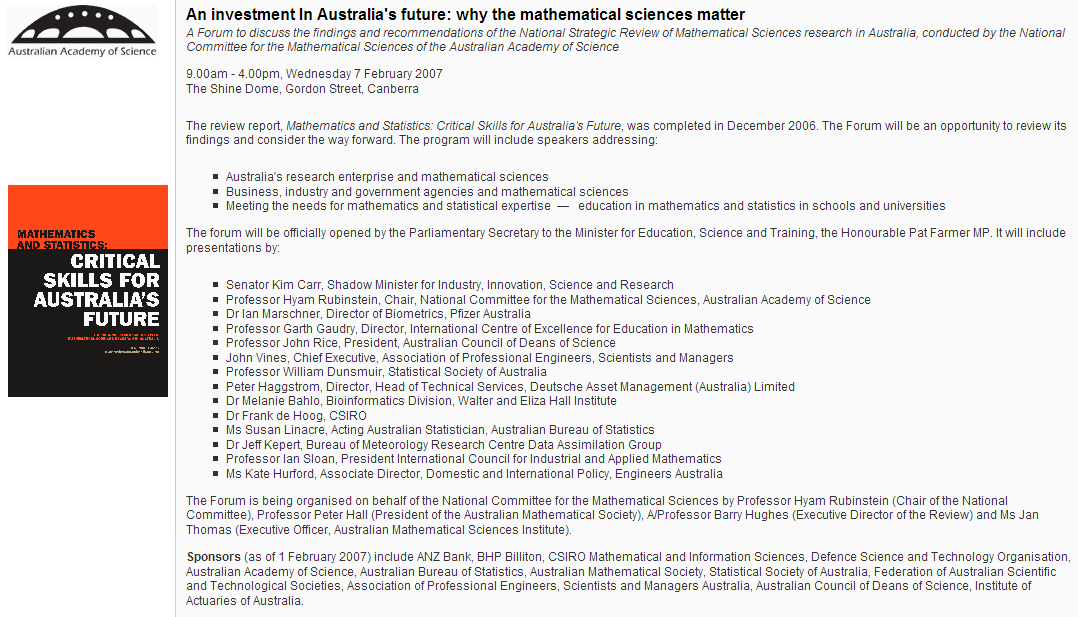|
|
|
|
|
|
|
News & Views item - January 2007 |
![]() An Assembly for the Discussion of a Question of Public Consequence. (January
31, 2007)
An Assembly for the Discussion of a Question of Public Consequence. (January
31, 2007)
Following a year's assessment and deliberation The National Strategic Review of Mathematical Research in Australia, was released on December 14, 2006. It concludes that representation of mathematics and statistics in Australia's university sector is dangerously deficient and recommends an immediate injection of funds to rebuild university mathematics and statistics departments, the protection of their autonomy.
An outcome of the report is a forum, An investment In Australia's future: why the mathematical sciences matter, to be held at the Australian Academy of Science's Shine Dome this coming Wednesday February 7.

Whether or not key federal parliamentarians and/or their advisors will make an appearance remains to be seen and whether they will remain to hear the views of both representatives of the private sector as well as academics...
The leader of the opposition, Kevin Rudd today promised that were he to lead Labor to power he would halve HECS fees for students allowing degrees in maths or science to be reduced from $21,000 to about $12,000 for maths and science students, and were the student to became a teacher or worked in a related occupation, the HECS debt would be reduced again for as long as the graduate remained in those jobs. This could take the bill to as low as $5000.
Mr Rudd would offer to the universities an as yet to be detailed supplement to make up for lost revenue.
"I want to encourage our brightest and our best to pursue careers in maths and science because our country needs it," Mr Rudd said. "If you are going to be serious about this nation's long-term economic prosperity you've got to be looking after the drivers of that prosperity. Maths, science, engineering - the enabling disciplines - are critical to our economic competitiveness. Maths and science are in a state of crisis in Australia and if you don't deal with a crisis what follows is a slow death."
What Mr Rudd has not addressed so far is what he intends to do to reverse the degradation that has occurred in the nation's tertiary institutions as regards their science and mathematics departments, and the incentives to bring competently trained teachers of maths and science into the public schools.
In response the federal Minister for Education, Science and Training, Julie Bishop, said, "Labor's policy has missed the point. We must focus on engaging young people in science and maths, in primary school and secondary school - capture their imagination while they are young."
Professor Glyn Davis, Chair of the Group of Eight, in noting the release of the ALP’s New directions for maths and science said although the Go8, "supports increased public funding in cases where a strong public benefit can be demonstrated and believes that such an argument is relevant to the teaching of science and maths in schools and universities, we do believe, however, that some caution should be exercised in proposing HECS reductions up-front. Such a mechanism has not yet been proven as a successful inducement for students to choose specific courses of study."
The president of the Federation of Australian Scientific and Technological
Societies (FASTS), Professor Tom Spurling, while welcoming Labor's announcement
which would reduce the HECS debts of science and maths students noted,
"Addressing the growing shortage of qualified science teachers is a complex task
- but reducing student debt is unlikely, in isolation, to make a huge impact.
There are serious issues to be addressed if school science education is to
contribute effectively to the development of the future to which Australians
aspire. Close attention needs to be given by Governments, teachers and the
science and technology sectors to improve infrastructure for science in both
schools and universities, provide ongoing professional development of teachers
and develop relevant and engaging curriculum.
"While today’s announcement is welcome, it does not increase
the resources to universities to improve teaching infrastructure or address the
underlying quality issues within universities. Therefore it is unclear how
today’s proposal will avoid some of the problems that have arisen despite
similar reductions in HECS debts for teaching and nursing. Accordingly, FASTS
looks forward to future announcements from Labor on how it intends to pull these
threads together to ensure Australia has the calibre of science and mathematics
graduates to take the nation forward."
It will be interesting to see what effect his new advisor, Maxine McKew, may have. In her article in today's Bulletin she writes, "Why are we falling behind in maths and science? Why aren't we more aggressive in tackling climate change? Have we wasted years of opportunity? What about the future? I've spent 30 years asking questions such as this. Now it's time to wrestle with the answers."
But it also remains to be seen what Mr Rudd's shadow ministers for Innovation, Industry, Science & Research, Senator Kim Carr, and Education & Training, Steven Smith will contribute to the furthering of the policies for the sectors for which they've been given responsibility.
The time is rapidly approaching for Mr Rudd to demonstrate that he is something more than just another posturing politician despite being endowed with more wit than many.